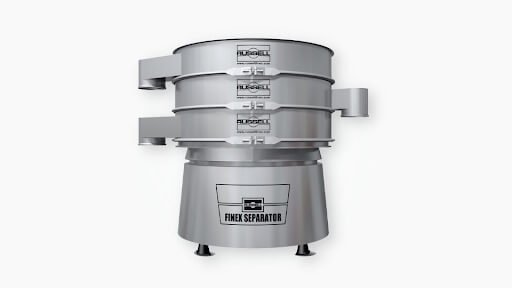Automatic Sieving Machines: Streamlining Material Separation Processes

In industries that involve the processing of raw materials, the need for efficient separation of particles based on size is paramount. Whether in food processing, pharmaceuticals, chemicals, or mining, material separation is a crucial step to ensure quality, consistency, and productivity. Automatic sieving machines have revolutionized this process by providing faster, more efficient, and highly accurate separation of materials, significantly enhancing operational workflows. These machines are designed to automate the sieving process, reducing labor costs, improving consistency, and boosting productivity.
What Are Automatic Sieving Machines?
Automatic sieving machines are advanced mechanical systems that separate materials based on their size without the need for manual intervention. Unlike traditional sieving methods, which require operators to manually sift and sort materials, automatic sieving machines use automated controls to manage the sieving process. These machines are often equipped with a series of screens or sieves, through which materials are fed. The screens vary in mesh size to allow smaller particles to pass through while retaining larger particles.
The automation aspect of these machines involves the use of motors, vibration mechanisms, or centrifugal forces to enhance material flow and ensure that the sieving process is consistent, efficient, and precise. Many modern automatic sieving machines are also equipped with features like adjustable mesh sizes, advanced monitoring systems, and automatic cleaning capabilities to reduce downtime and improve the overall operational efficiency.
Key Benefits of Automatic Sieving Machines
Increased Efficiency
One of the primary advantages of automatic sieving machines is their ability to process large volumes of material in a short amount of time. Automated systems eliminate the need for manual handling, significantly reducing the time it takes to separate particles. This is particularly beneficial in industries where high throughput is required, such as food processing or mining, where the separation of large quantities of raw materials is essential to meet production targets.
Improved Consistency and Accuracy
Automatic sieving machines provide a higher level of accuracy compared to manual methods. By using vibration or centrifugal force to separate materials, these machines ensure uniformity in the separation process. The precision of automatic sieving reduces the chances of errors, such as inconsistent particle sizes, which can lead to product defects or reduced quality. This consistency is particularly important in industries like pharmaceuticals, where the precise particle size of ingredients can directly affect the quality and efficacy of the final product.
Reduced Labor Costs
Manual sieving can be a labor-intensive process, requiring operators to constantly monitor and adjust the sieving procedure. Automatic sieving machines reduce the need for manual intervention, allowing businesses to cut labor costs and allocate workers to other tasks. The automation also reduces human error, further optimizing labor resources and enhancing productivity.
Minimized Downtime and Maintenance
Modern automatic sieving machines are designed with features like self-cleaning systems and advanced monitoring capabilities, which help reduce downtime. Traditional sieving methods often involve the need for operators to stop the process to clean sieves or adjust settings. With automatic machines, the cleaning process is streamlined and automated, ensuring that the machines continue running smoothly without frequent interruptions. Additionally, many machines come with diagnostic tools that provide real-time feedback, helping operators identify and address any issues before they cause significant problems.
Versatility Across Industries
Automatic sieving machines are versatile and adaptable to a wide range of industries. In food processing, they can be used to sift flour, sugar, and spices, ensuring that only the finest particles are included in the final product. In pharmaceuticals, they help separate active pharmaceutical ingredients (APIs) to ensure uniformity and consistency in medication. In mining and recycling, automatic sieving machines separate valuable ores or recyclable materials from waste, maximizing efficiency and profitability.
Enhanced Safety and Compliance
In industries such as food processing and pharmaceuticals, safety and compliance with regulations are critical. Automatic sieving machines ensure that materials are free from contaminants and meet the required standards. By using automated controls, these machines reduce the chances of contamination from human handling, ensuring that products meet quality and safety standards.
Applications of Automatic Sieving Machines
- Food Industry: Automatic sieving machines are used to refine ingredients such as flour, sugar, and grains by removing impurities and clumps. They ensure consistent particle size for baking and processing, improving the texture and quality of the final product.
- Pharmaceutical Industry: These machines play a crucial role in ensuring that pharmaceutical powders are of the correct particle size, which is essential for the formulation of tablets, capsules, and other medications. Proper sieving ensures the correct dosage and bioavailability of drugs.
- Chemical Industry: Automatic sieving machines are used to classify chemicals, powders, and granules based on size, ensuring that each product meets the required specifications for its intended use.
- Mining and Recycling: In mining, sieving machines separate valuable minerals from waste, enhancing recovery rates. Similarly, in recycling, they help separate recyclable materials, contributing to more sustainable processes.
Conclusion
Automatic sieving machines have transformed material separation processes across multiple industries by improving efficiency, consistency, and accuracy. Their ability to streamline operations, reduce labor costs, and enhance productivity makes them an essential investment for businesses looking to stay competitive in today’s fast-paced industrial environment. As automation technology continues to evolve, automatic sieving machines will undoubtedly play an even greater role in optimizing production processes, reducing waste, and improving product quality across a wide range of industries.







